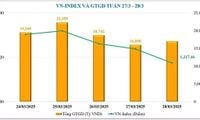The VINACAPITAL VN100 ETF has announced its portfolio restructuring effective March 31, 2025, a move that reflects the evolving landscape of Vietnam's stock market. As the VN-Index recently surpassed 1,300 points, signaling a growth of 4% from the beginning of the year to March 28, the performance of many open-ended funds has not mirrored this success, raising concerns among investors.
Despite the VN-Index's upward trajectory, many open-ended funds are reporting disappointing results. According to data from Fmarket, several funds have posted negative performance, with VCAMDF declining by 4.29%, VLGF by 3.17%, UVEEF by 3.06%, VESAF by 2.73%, and NTPPF by 2.53%. Other funds, such as DCDE, PHVSF, and VMEEF, also experienced declines ranging from 1.6% to 1.8%. In stark contrast, MBVF led the pack with a 4.12% increase, slightly outperforming the VN-Index. BVFED and TCGF also managed to maintain growth with increases of 3.64% and 3.08%, respectively.
This disparity in performance highlights significant pressure on many funds' investment portfolios. While some funds have managed to achieve positive returns, the overall trend reveals a stark divide between those benefiting from market gains and those struggling to keep pace.
Investors are left wondering what has caused this divergence, especially as the VN-Index continues to rise. The answer lies in the concentration of investments in certain stocks. Many funds have seen their performance impacted by their heavy weighting in specific sectors, particularly in the "Vingroup" and "FPT" stock groups, as well as banking stocks. Unlike two to three years ago, some open-ended funds have reduced their holdings in stocks like VIC and VHM, with MBVF being a notable exception.
In March, the "Vingroup" stocks experienced a significant rebound, likely driven by positive news such as Vinpearl's listing plans. However, funds have reduced their stakes or exited positions in VRE, similar to their actions with VIC and VHM. Conversely, FPT stocks have remained a top holding for many funds, including MGF, BCF, VESAF, DCDS, DCDE, and VMEEEP, which has hindered their performance.
FPT has faced a notable decline since the Lunar New Year, with its stock price dropping approximately 19% from the beginning of the year to March 28. This downturn can be attributed to significant net selling pressure from foreign investors, as FPT has been the most heavily sold stock in the market. Additionally, a general weakness in global technology stocks and increased competition in the IT sector have dampened investor sentiment.
Trần Hoàng Sơn, the Market Strategy Director at VPBankS, noted that FPT's recent price increase was closely tied to trends in U.S. technology stocks, particularly those in the "Magnificent 7" led by Nvidia. However, the end of 2024 and the beginning of 2025 saw a profit-taking trend emerge as technology stock valuations reached high levels. After rising about 50% since the start of 2023, FPT has now fallen below its 200-day moving average, signaling potential risks for further declines.
Sơn emphasized that FPT's high valuation, with a price-to-earnings (P/E) ratio nearing 30 and a price-to-book (P/B) ratio around 7.5, combined with foreign net selling pressure, could lead to continued downward pressure on its stock price in the short term. Additionally, the Pyn Elite Fund has issued warnings regarding risks associated with technology stocks, including FPT, suggesting that some tech stocks are now overvalued, creating a bubble risk in the market.
In contrast, the banking sector has emerged as a favorite among open-ended funds, typically comprising a significant portion of their portfolios. Most leading bank stocks, such as VCB, TCB, ACB, CTG, MBB, SHB, and STB, have shown positive growth in the first quarter of 2025, although performance has varied across different banks. Some stocks, like BID, VIB, and VPB, have remained stagnant, while TPB has seen sharp declines.
This variation has contributed to distinct performance profiles for each fund based on their individual banking stock holdings. As the market continues to evolve, open-ended funds are closely monitoring market developments to make necessary adjustments to their portfolios.
Despite the current pressures, many fund managers and analysts maintain a positive outlook for the stock market in 2025. Although there is a clear divergence in performance, the Pyn Elite Fund remains optimistic about Vietnam's long-term prospects. They argue that, compared to other economies, Vietnam stands out due to its stable GDP growth, abundant foreign direct investment (FDI), and flexible macroeconomic policies.
The fund believes that the Vietnamese economy is poised for a strong recovery following short-term fluctuations, with expectations for improved market liquidity as domestic investor capital continues to play a crucial role. They emphasize that while some sectors face adjustment pressures, significant opportunities remain in consumer goods, banking, real estate, and technology.
Moreover, government initiatives to boost public investment and economic support packages will provide foundational support for the stock market in the long run. With current valuations, many stocks still have attractive growth potential, especially as Vietnam garners increasing interest from foreign investors.
Even amid certain adjustments, the Vietnamese stock market is regarded as an appealing investment destination in a globally unstable economic environment. Despite short-term fluctuations, Dragon Capital continues to express a positive view of the Vietnamese stock market, asserting that these adjustments are temporary and do not alter the long-term growth trajectory.
Dragon Capital notes that Vietnam's macroeconomic fundamentals remain stable, with controlled inflation, flexible monetary policies, and robust foreign investment flows. They recommend that investors take advantage of market corrections to increase their stock holdings, particularly in companies with strong financial foundations, stable profits, and long-term growth potential.
Similar to the Pyn Elite Fund, Dragon Capital emphasizes that many stocks are currently attractively priced following recent corrections, presenting excellent opportunities for medium- to long-term investors. They also predict that foreign investment will return as market conditions stabilize, particularly as Vietnam has many opportunities to upgrade its market status to emerging market status. Factors such as economic support policies, improved liquidity, and the recovery of key sectors will drive the stock market's growth in the near future.






